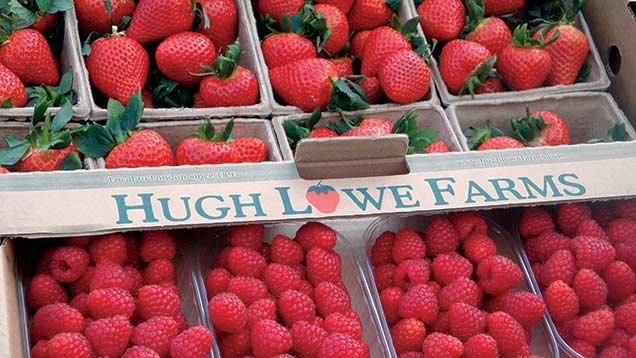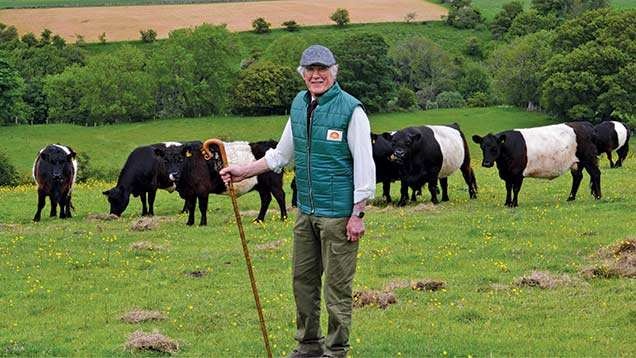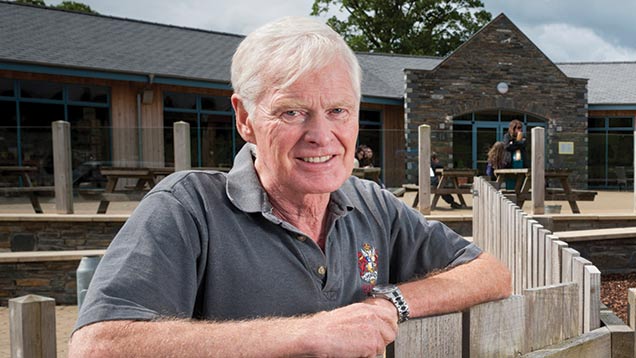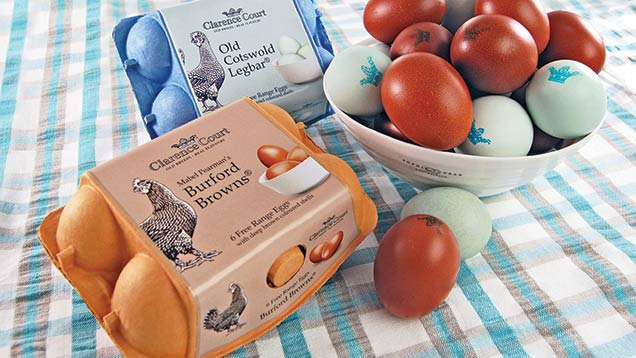Farmers supplying top retailers reveal how they do it
Getting your product stocked by top-end outlets can be a passport to success for farmers.
Meet four who have managed to open doors to retail and restaurant royalty.
See also: 5 tips for getting a farm product into prestige markets
Finest English strawberries court favour at Wimbledon
Fresh, succulent British strawberries are as much a part of the Wimbledon Championships as the tennis itself.
Hugh Lowe Farms has been growing soft fruit for more than 120 years near Maidstone in Kent, and supplying the prestigious tournament for a quarter of a century.
The farm run by fourth generation farmer Marion Regan and her husband Jon, produces more than 3,000t of strawberries and 700t of raspberries a year, in rotation with arable crops on the greensand ridge above the Weald, on the well-drained sunny south-facing slopes.
The land is so suited to growing strawberries that wild ones thrive in the local woods.
And it’s these perfect conditions, coupled with the growing practices, which enable it to produce world-class fruit.
Marion and her team grow many different types of strawberry and supply a variety to Wimbledon, including Elsanta, Sonata and Malling Centenary, all of which are June-bearing, producing their fruit at the start of the season.
“My great-grandfather started farming here so it was easy to get fruit to London; one of our fields planted for Wimbledon-time is only 14 miles from the Tower of London”
Marion Regan
“These varieties are all pretty similar – they’re really good eating, so they’re juicy and sweet, and not too large because Wimbledon wants to put them in little pots for individual servings with some cream,” explains Marion.
“We do supply other varieties now that the tournament is later. We supply later varieties of everbearers as well, which flower and fruit all summer long.”
The tournament’s demand for local produce led to the farm becoming a supplier.
“We were probably the closest strawberry growers to London.
“That’s the reason my great-grandfather started farming here so it was easy to get fruit to London; the majority of the farm is further away, but one of our fields planted for Wimbledon-time is only 14 miles from the Tower of London,” she adds.
As well as supplying Wimbledon with at least 30t of strawberries each year, the farm’s produce is also enjoyed at Goodwood Races, and supplied to major multiples including M&S, Waitrose and Tesco, plus numerous restaurants and hotels through wholesalers.
Preservation of the environment is at the heart of its operation, with spraying kept to a minimum and bio-control used wherever possible, says Marion.
The British season lasts six months, meaning the whole of the team works really hard year round.
“For us, sales are equally important through August and September as the earlier summer months.
“But events like Wimbledon are a really fantastic shop window for British strawberries and raspberries,” she explains.
“A lot of events in English society want English strawberries, and I think, the more traditional the event, the more careful the organisers are.
“They are more concerned with the quality and provenance which they serve their visitors.
“Food is part and parcel of a day out now – and that provenance and quality is what we provide.”
Pedigree beef sets its own Rules
By turning modern methods on their head, one cattle farmer is producing beef that has developed quite a following in London’s oldest restaurant.
Paul Coppen’s pedigree belted Galloway beef has been exclusively on the menu at Rules for the past 17 years, where a list of enthusiastic customers is contacted when it arrives in around January/February.
Having established his pedigree Gilmonby herd in County Durham 30 years ago, he says the key to understanding the quality of the beef lies in the management of the herd and his adherence to natural and sustainable practices.
“The management techniques here are opposite to modern methods because the cattle are reared slowly on a grass-and-hay-only diet and are killed much later at three to four years old,” Paul explains.
“For those who appreciate traditional steaks and roasts, leaner, drier meats can leave much to be desired”
Paul Coppen
“Mainstream markets prefer continental breeds of cattle that mature quickly due to the more intensive feeding.
“Many would argue, however, that beef quality has declined and the consumer has been led more and more towards paler-coloured meats which are leaner, drier, have little marbling and less flavour.
“That may be fine for much of today’s market with its emphasis on convenience food, but for those who appreciate traditional steaks and roasts it can leave much to be desired.”
Because of the slow way in which it is reared, Belted Galloway beef is mature, dark in colour and incorporates thin marbling layers of fat which impart flavour, texture, succulence and tenderness.
Rules in Covent Garden, which can trace its origins back to 1798, enhances it further by hanging it for up to four weeks under controlled conditions.
The restaurant began serving the beef after its head chef happened upon it in a butcher’s in Barnard Castle while on holiday.
He took half a cow back to London and, after hanging and experimenting with it, asked Paul if he would supply the restaurant.
The Gilmonby herd is not given any preventative medication or routine chemical worm control, instead relying on its natural immune defence system.
Welfare considerations are a top priority and so long journeys to the abattoir are avoided at all cost, with them being slaughtered close to home.
When it comes to supplying prestige markets, Paul believes producers have got to decide whether they are prepared to forgo quantity for quality.
“I’m proud to have supplied Rules for the past 17 years,” he adds.
“It’s quite a contrast considering the beef is raised on a remote and isolated upland farm near Barnard Castle, in County Durham, but ends up immersed in the hustle and bustle of city life in the capital.”
Michelin-starred lamb from Caernarfon to Dubai
It may sound obvious, but ensuring the meat it produces has the best possible flavour is key to the success of the Rhug Estate.
It supplies more than 20 Michelin-starred restaurants as well as Dubai’s renowned seven-star Burj Al Arab luxury hotel.
About 10,000 Welsh organic lambs are born, bred and reared each year at Lord Newborough’s estate, with some kept at the main farm in Corwen, Denbighshire, and others raised on the salt marshes near Caernarfon.
And it’s the latter which is proving popular with top chefs worldwide – thanks to its unique flavour.
Lord Newborough, who was named Farmers Weekly‘s 2013 Farmer of the Year, credits the meat’s sweet, delicate taste to the stress-free environment in which the animals are kept, coupled with the livestock’s healthy and balanced diet.
“Chefs are experts in flavour – they look to the best ingredients to give them the best flavour, so the product has simply got to be the best”
Lord Newborough
This includes organic arable crops, vetches, beets and herbs as well as the samphire left behind after the salt marshes flood each winter.
“It’s simply down to the way we produce it. The fact it’s organic is undoubtedly the big point of difference.
“I think the reason why we hit the right spot with top chefs is that the lamb is brought up in a completely stress-free environment at every stage – you just get a far superior product at the end.”
The Rhug Estate has been in Lord Newborough’s family since the 9th century; in 2002 it began retailing from the farm gate, selling takeaway burgers, hotpots and farm-fresh meat.
Two years later Rhug began wholesaling to restaurants in the south east, and then exporting to Singapore, before demand from other major foreign markets grew.
As well as the organic Welsh salt marsh lamb, the estate also produces Aberdeen Angus organic beef, organic chickens, geese, turkeys and venison, which it supplies to a variety of outlets including independent delis, baby food companies, yachts, gastro pubs and restaurants such as The Ritz, Connaught and Dorchester Grill in London.
“To anyone looking to supply these markets I would say a lot of chefs are experts in flavour – they look to the best ingredients to give them the best flavour, so the product has simply got to be the best,” explains Lord Newborough.
“Those chefs know if the Rhug brand goes on the menu, the Michelin inspector will immediately be able to tick three boxes – provenance, organic and quality. It also shows the chef is sourcing quality products.
“We have a state-of-the-art cutting plant; the meat is aged in a specially built chamber – and we are able to provide a personal bespoke service to chefs.”
Free-range brand that is cracking the market
Staying true to its core values and providing people with something different is at the heart of Clarence Court, which has been supplying free-range eggs to Harrods for more than a decade.
Its hens’ eggs come from producers across the UK, while Tremayne, its special breeds farm in Cornwall, is home to a small number of hens as well as 5,000 free-range laying ducks, a further 1,000 ducks in rear, 10,000 quail and 28,000 layer pullets plus seasonal fowl including geese, rhea, ostrich, pheasant and guinea fowl.
Sales and marketing director Chris Moreman says that by combining its rare breed hens and other species with natural, sustainable husbandry techniques, Clarence Court is able to produce delicious eggs, which look – and taste – like those enjoyed many years ago.
“We offer something very different to other, normal egg producers and once you’ve tried one of our eggs, you’d be very hard pushed to go back to a standard free-range egg,” he says.
“If you look at the eggs produced by our rare breed Burford Brown hens, they have hard, dark shells, reminiscent of how eggs used to be.
“Once you’ve tried one of our eggs, you’d be very hard pushed to go back to a standard free-range egg”
Chris Moreman
“They have a golden, rich yolk compared to standard yellow yolks and firm whites and that’s all down to the husbandry – the way we produce them and how we feed and range the birds.
“It’s all wholesome, down to their feed, which is high in maize – there’s nothing in there to enhance anything. We have small flock sizes and the birds are encouraged to range further.”
Originally set up as a conventional cage egg and rearing unit in 1972, Tremayne was converted to a barn-egg and floor-rearing facility in the 1990s, before becoming the company’s alternative breeds free-range production centre.
About 20 years ago it witnessed a breakthrough, having spotted a gap in the market to deliver something a little different to the other eggs available at the time.
It was this unique selling point which, over time, led to its eggs being stocked in Harrods, as well as Fortnum & Mason, Selfridges, Waitrose, Sainsbury’s and London’s Whole Foods Market.
Clarence Court eggs are also on the menu at The Ritz and Jamie Oliver’s 15 restaurants, while other ambassadors include Rick Stein, Mark Hix and Tom Aikens.
They are not the cheapest eggs available, concedes Chris. Goose eggs, for example, retail for £6.99 each – but they are produced for quality rather than quantity and the birds have to be maintained all year.
“It all comes down to having something that truly is unique, really knowing your marketplace and never wavering from what you want to achieve,” he adds.
“People are much more aware of what they are eating these days and want to know about the product’s traceability – don’t compromise on what you’re trying to do.”




